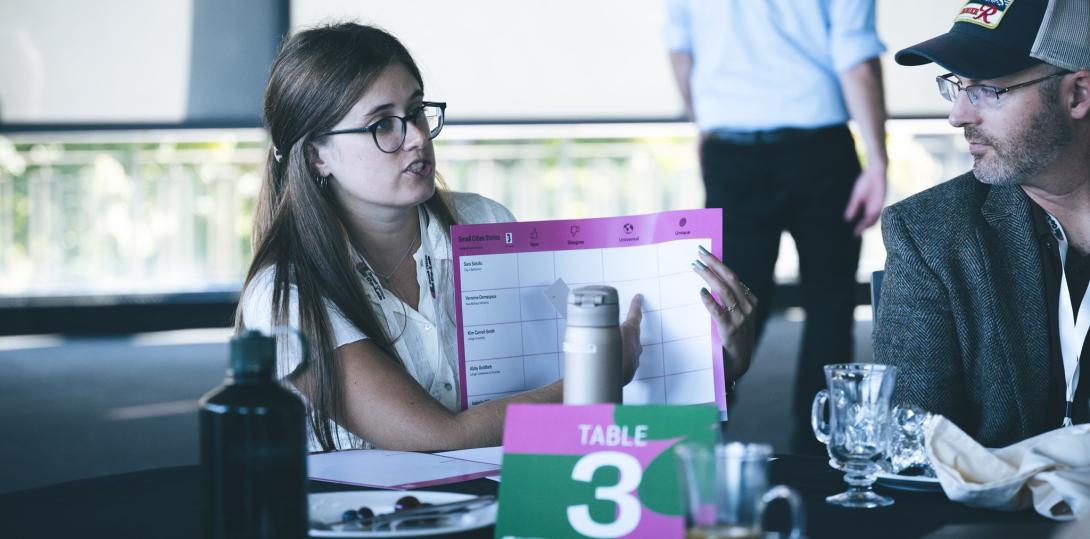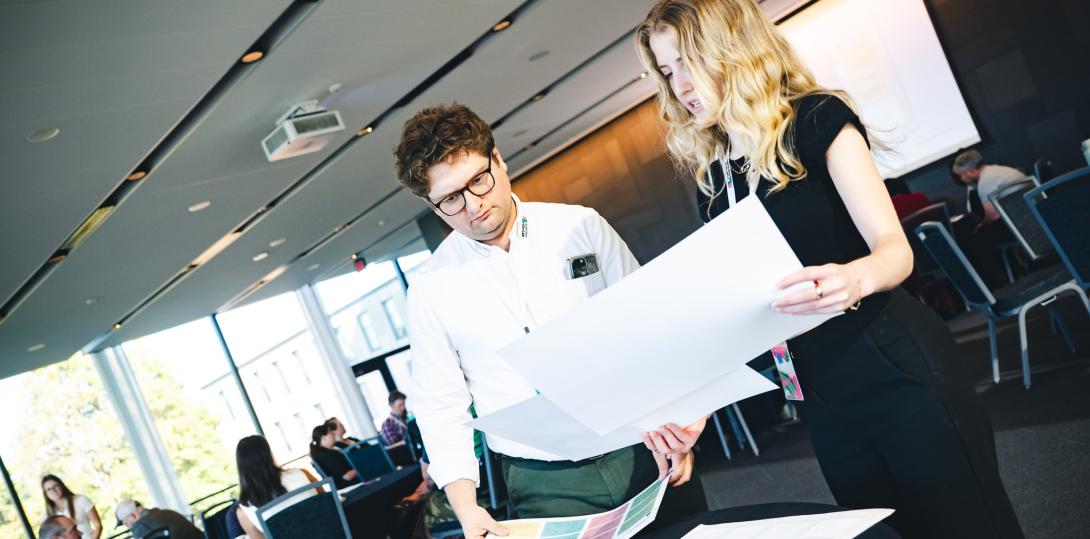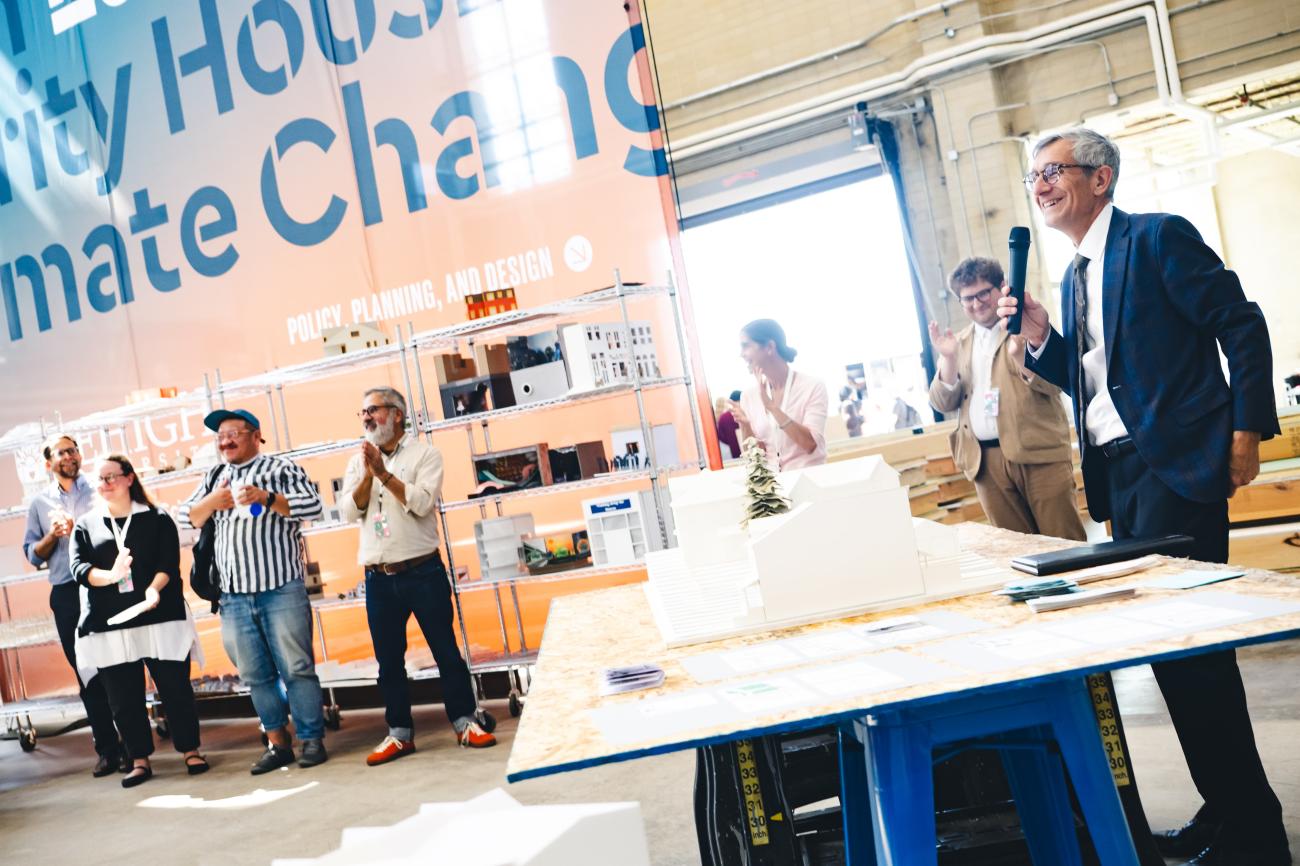Small Cities Lab Hosts Inaugural Co-Lab
Inaugural event gathered researchers and community leaders at Lehigh’s Mountaintop campus.
What is a small city, anyway? The Small Cities Lab brought together people from various sectors and disciplines to tackle this prevailing question. It’s not just a question about numbers — the size of a population, for instance — but about stories. It was clear from the people in the room that what makes a small city unique is the community it creates.
The two-day event, featuring sessions, talks, and workshops was held September 18–19 in Iacocca Hall’s Wood Dining Room. Guests looked out over the Lehigh Valley as the morning sun lifted the fog—a fitting backdrop for opening remarks by Robert A. Flowers II, the Herbert J. and Ann L. Siegel Dean of the College of Arts and Sciences.
“The work of the Small Cities Lab is guided by a commitment to epistemic humility, approaching every project with a beginner’s mindset, listening deeply, learning from others, and shaping projects collaboratively,” Flowers said. This work is deeply personal to Flowers, who shared his own story of a challenging time growing up when his family was without permanent housing. “We can achieve much more when communities, universities, governments, and nonprofits bring their strengths together,” he concluded. “This model of partnership represents the possibility of dignity, security, and permanence for families who might otherwise be left without options.”
It was a touching reminder of why this work matters. Small cities, unlike larger metros, are often understudied, underserved, and unprepared for rapid growth as Wes Hiatt, co-director of Small Cities Lab and assistant professor of architecture, pointed out. This is especially significant given that over half of Americans live in smaller places and many people are moving to them. “The core goal of the Small Cities Lab is to fill in that knowledge and resource gap,” said Hiatt, assistant professor or architecture in the Department of Art, Architecture, and Design.
Since its inception, the work of the Small Cities Lab (SCL) has been rooted in the partnership between the larger Bethlehem Community and Lehigh University. Bethlehem was one of SCL’s earliest community partners, a collaboration that helped shape and refine many of the lab’s first ideas. Since then, SCL has expanded to work with a range of communities across the Lehigh Valley and beyond. Lightning keynote speakers, all residents of the Lehigh Valley, shared their personal experiences. Sarah Satullo, Deputy Director of Community Development, for the City of Bethlehem, Veronne Demesyeux, Associate Executive Director of New Bethany, Bethlehem Community Leader Kim Carrell-Smith, Abby Goldfarb, Executive Director of the Lehigh Conference of Churches, and Isabelle O’Toole, Small Cities Lab Research Associate recounted stories of living and working in the Lehigh Valley, touching on the memorable events, historic buildings, neighborhoods, and homes that have shaped their lives.

Carrell-Smith, professor emerita of political science at Lehigh University, highlighted how church steeples and steel stacks are iconic parts of the Southside Bethlehem skyline. “Those buildings persist and give us a sense of continuity about who we are and our story of immigration, which is really the story of Bethlehem,” she said. People that come to Bethlehem start to adopt it as their story too, she noted.
These perspectives were just the beginning of discussions about what makes small cities different from rural areas or large cities. Throughout the day, Small Cities Lab members gathered responses, experiences, ideas, and challenges from participants to help define the "small city" and set their priorities and research agenda. “We wanted to make the Co-lab as collaborative and interactive as possible,” Kevin Lahoda, member of the Small Cities Lab and assistant professor of design, remarked.
By the afternoon, participants had created profiles of their own cities. This year’s Co-lab focused mostly on small cities in Pennsylvania and surrounding Mid-Atlantic, Midwestern, and Northeastern states. Participants prioritized characteristics across these categories: natural environment, built environment, social and cultural, and economy and institutions.
What started as an exercise with individual cities merged into a representative picture of small cities in general. “There are a variety of small cities, each with goals of building learning communities and networks,” said O’Toole. By learning that cities grapple with similar challenges, it opens up opportunities for community conversation.
Karen Beck Pooley, co-director of Small Cities Lab and professor of practice of political science, distilled some of the event’s themes. “A lot of conversations around small cities include community events, placemaking activities, and spaces that bring people together,” she said. “What are the ways to leverage those social connections to entice people to stay, invest their time, and resources into small cities.”
Beyond painting portraits of real and imagined small cities, the second day of the Co-lab transitioned to discussions about the importance and challenge of cross-sector work. One such cross-sector project within the Lehigh research center is disability health, social life, and wellbeing. This project was conceived by Christina Zhang, assistant professor of architecture, and Austin Duncan, assistant professor of disability independence, on their first day of faculty orientation last year. Their subsequent research has revealed massive critical gaps in infrastructure in Bethlehem.
“Larger cities have extensive resources, but not very much in terms of community support for individuals with disabilities. Smaller towns have a lot of robust community support, but very poor infrastructure and resources. Small cities are in a strange spot in between where they often have either, neither, or a little bit of both,” Duncan explained.

This is just one example of the importance of focusing on and including small cities in academic research and on a larger scale across government and the non-profit sector. Participants attended panels on university-based community design centers, housing policy across scales, navigating change in small cities, and oral histories and community stories. Facilitation training, grant-seeking and project coalition building, and green building techniques were the workshops that put these discussions into practice.
Building C Highbay C2 was buzzing with activity for the Small Cities Lab open house. Students, faculty, staff, and community members mingled around a showcase of ongoing Small Cities Lab projects. These projects address a spectrum of urban challenges in the context of smaller cities, including housing, zoning change, accessibility, economic development, climate adaptation and more. The exhibit included posters, drawings, models, maps and other interactive stations, including the city portraits created by the Co-lab participants.
“One of the things I love to see as a university president, particularly a president of a university like Lehigh that is grounded, down to earth, and pragmatic in a way that means we are focused on addressing challenges the world faces today, is the deep engagement with so many in the community,” said President Joseph J. Helble '82.
Change is inherent for any place but poses particular challenges for smaller metros. A sense of community, participation and engagement, history and change were some of the themes distilled from the narratives. Finding a balance between these commonalities is just a start to the broader, enduring question: Where do we go from here?
The Co-lab ended on a note of optimism for the future. This event was a critical step in building relationships and setting an agenda for action while giving participants some tools, frameworks, and resources. There is power in the collective, and what resonates most with people is connecting with others.
More than the strong sense of community found in small cities is a real sense of place and belonging that is hard to find elsewhere. The Small Cities Lab hopes to study, amplify, and preserve these sentiments for years to come, both in the Lehigh Valley and across the country.

